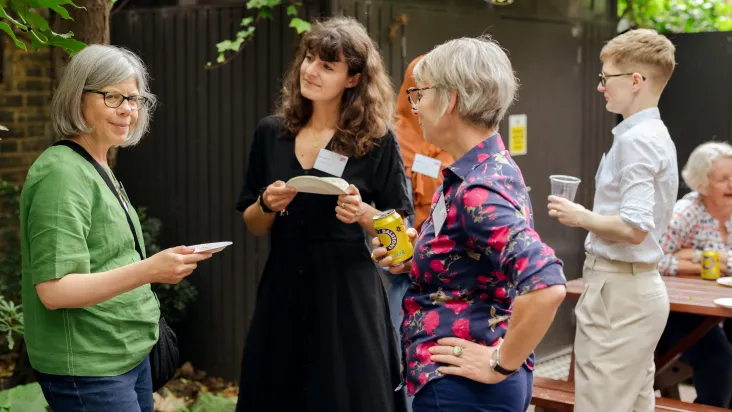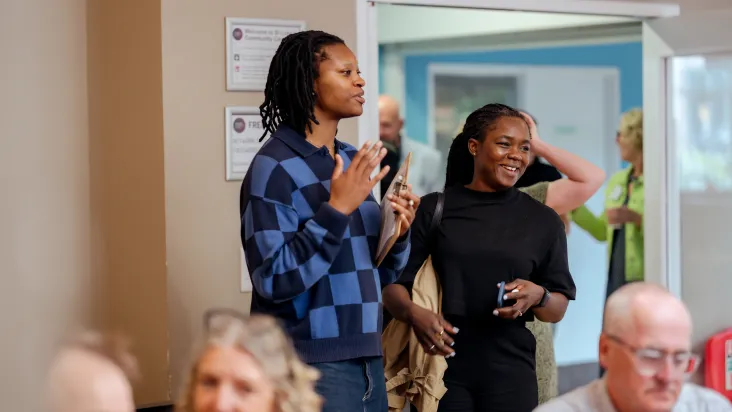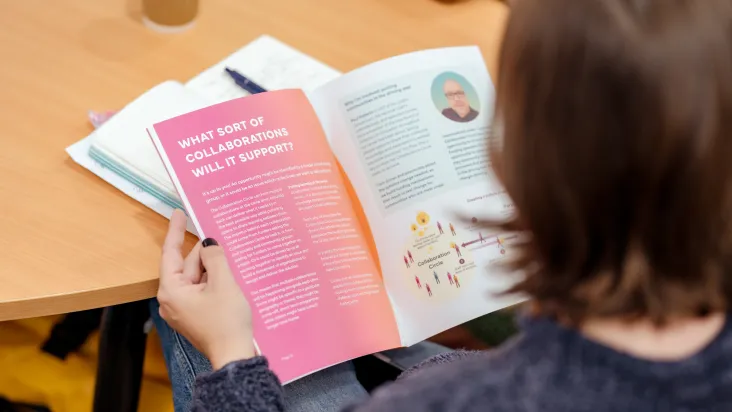Across sessions on wellbeing, infrastructure, tech, and equity, a shared theme emerged: to build resilient organisations, funders need to invest in the fundamentals - core costs, infrastructure, wellbeing, and leadership - and do so in ways that are flexible, long-term, and rooted in trust.
This summary brings together reflections from across the Festival, offering insights about how funders are evolving their approaches to build long-term resilience for the organisations they support.
Why funding the basics matters more than ever
It will be no surprise to London Funders’ members that voluntary and community organisations are under immense pressure and have been for a considerable time. We’re seeing a rise in charity closures, increased demand for services against a backdrop of higher costs and less funding. At the same time, most of our members are experiencing growing demand for funding and conversations across London Funders’ local funder forums have revealed, in the words of our Associate Director, James Goodman, an “increasing sense of brittleness and fragility across the sector”.
Funders in London Funders’ network are responding to this context in a wide range of ways, and as a membership organisation, we’ve worked with funders since 2019 to think about how we can build the resilience of community-facing organisations. Since then, our work on resilience has evolved from a focus primarily on the pressures facing the civil society workforce - including burnout, poor mental health, and the impact of austerity - to a broader understanding of what it takes for organisations and ecosystems to thrive and sustain their work long-term. That shift has prompted funders to look beyond short-term project funding and towards investing in the fundamentals - core costs, infrastructure, and the well-being of the people doing the work.
Sessions hosted during the Festival made this shift even clearer. These fundamental building blocks are not a luxury. They are the foundation for everything else.
"Even giving unrestricted funding is an important step - it could lead organisations to start thinking about different models and diversifying their funding portfolios"
Enterprise as a path to resilience
The sessions hosted by School of Social Entrepreneurs explored how funders can support organisations to build entrepreneurial thinking, diversify funding models, and explore earned income — not as a silver bullet, but as one tool in a wider resilience strategy.
One such tool is Match Trading - developed by our member, The Social School for Entrepreneurs, back in 2017. Match Trading is an innovative way of delivering grant funding to social enterprises, whilst helping them grow their business. At its core, it’s grant funding that pound-for-pound matches an increase in income from trading.
"Now that there's less money about, and things are just tougher, it's no longer kind of ‘nice to have’ for us to be thinking about enterprise, or earned income, or diversifying our funder; it's just a necessity that needs to happen in the sector"
Earned income can offer organisations greater autonomy, flexibility, and sustainability - especially in a funding landscape where grant income is increasingly precarious. It allows organisations to invest in their people, improve services, and grow impact on their own terms. But it’s not without challenges.
Many VCSE organisations operate in areas of ‘market failure’, where beneficiaries cannot afford to pay for services. Leaders must identify proxy markets - such as schools, local authorities or corporates - and navigate complex procurement systems. For marginalised leaders, this journey is even harder. SSE’s data shows that Black-led organisations and those in IMD (Index of Multiple Deprivation) areas outperform their white peers at the startup level but fall behind at scale-up - often due to lack of access to networks, procurement opportunities, and wider support.
"There’s an interesting story here about enterprise providing a kind of power and agency to organisations to grow in their terms, rather than being driven by a funder per se"
Funders must be intentional in how they design enterprise support. That means going beyond technical capacity building to create space for peer learning, safe reflection, and giving people time and space to engage with those structural and systemic issues. Working with partners or intermediaries who can provide support, access to networks and ensuring that enterprise programmes are inclusive, accessible, and designed with equity in mind.
"Not every funder will necessarily want to have an enterprise development focus as part of their funding, but there are mechanisms in how we all fund that can allow organisations to be enterprising in the way that they undertake their work to be more resilient and sustainable"
Funders can also support resilience through unrestricted funding, multi-year grants, and Funding Plus models that include enterprise development. These approaches help organisations build sustainability in ways that align with their mission, not distract from it.
Wellbeing is infrastructure
Across the Festival, a recurring theme was the pressure facing the people working in civil society organisations. Staff burnout, trauma exposure, and emotional fatigue are increasingly common - especially in organisations working on the frontlines of social justice and service delivery. As pressures on the sector have grown, funders like Esmée Fairbairn Foundation and the Legal Education Foundation (LEF) began exploring how they could better support the wellbeing of the organisations and people they fund.
Both funders had heard directly from grantees that wellbeing was a growing concern. Staff were struggling with the emotional toll of their work, compounded by financial precarity, rising demand, and the cost-of-living crisis. In response, Esmée and LEF each offered wellbeing uplifts to a cohort of grantees - with no strings attached. The goal was to give organisations the space and resources to support their teams and learn from what they chose to do with their wellbeing grant.
Every organisation used the funding differently — some for clinical supervision, others for away days, therapy, or joy. Some had sophisticated wellbeing systems already in place; others had never had a wellbeing budget before.
"Organisations run under so much pressure. They do recognise the need for wellbeing, but it is really difficult to prioritise that over service delivery"
Funders who attended the session echoed this. Many spoke about the challenges their grantees face in prioritising wellbeing when service delivery is urgent, and resources are tight. Others reflected on the emotional labour carried by staff with lived experience, and the need for funders to recognise the disproportionate toll this can take. There was also a candid conversation about the limitations of short-term wellbeing grants - and the risk of treating wellbeing as a one-off intervention, rather than a long-term commitment.
"Wellbeing isn’t a luxury. It’s a necessity. But it’s still seen as optional - especially by boards, and sometimes by funders"
One of the more surprising learnings was how difficult it can be for organisations to spend even small amounts of wellbeing funding. Some lacked the capacity to coordinate activities; others struggled to justify the spend internally. This revealed a deeper issue: the cultural and operational barriers that prevent organisations from embedding wellbeing into their core practice.
Funders in the session also reflected on their own role. Offering wellbeing support is not just about money - it’s about permission. By explicitly naming wellbeing as a legitimate use of funding, funders can help shift organisational norms and create space for care, reflection, and recovery.
"Providing a grant explicitly for wellbeing helps organisations prioritise it - even when they’re under pressure to deliver"
Looking ahead, both Esmée Fairbairn Foundation and LEF plan to continue their wellbeing support, refine their approach, and collaborate with other funders. There was a strong appetite across the Festival for a more joined-up response - one that recognises wellbeing as a core part of resilience, not just an add-on.
Equity and justice need infrastructure – and that infrastructure needs funding
The importance of strong infrastructure to create a strong civil society is something London Funders has long advocated for (some of you will remember the Way Ahead report back in 2016). In 2023, 360Giving released its infrastructure report, highlighting the lack of funding going towards infrastructure groups. In 2024, Pro Bono Economics and DCMS reported undertaking research to map the importance of funding infrastructure.
The resourcing of infrastructure was a recurring theme in several Festival sessions – we hosted a session on the interim findings from our Equity Infrastructure Mapping project, which has been exploring the state of specialist infrastructure, specifically for equity and justice organisations. With the full findings expected later this month, our Research & Evidence Manager, Shreya Gautam, highlighted that funding for equity and justice infrastructure has decreased across the UK in recent years, yet without it, grassroots equity organisations risk isolation, burnout, and missed opportunities for systemic change. This was echoed by the panel of speakers of have experience in funding or supporting infrastructure for equity and justice organisations, including the Black Funding Network, the Pathway Fund and the National Lottery Community Fund. We also heard that there is a lack of trust in mainstream systems (including mainstream charities and larger, more generalist infrastructure bodies), which makes local infrastructure organisations even more important. These organisations often have the trust of grassroots groups but are underfunded and under-recognised.
"Infrastructure isn’t just about buildings or systems — it’s about people, relationships, wellbeing, and community leadership"
The session hosted by Do It Now Now added further depth and learning to the conversation about specialist infrastructure and support for organisations led by and for their communities. Drawing on their work with over 2,000 Black-led organisations, they emphasised that infrastructure for Black-led organisations is needed to build operational efficiency, diversify income, and adapt to emerging challenges - including the rapid pace of change around technology and AI.
"We've noticed that when organisations have multi-year funding that they're actually able to develop strategically, look forward, and grow over four and five years as opposed to firefighting continuously"
There was also a call for funders to move beyond short-term project grants and towards long-term, strategic partnerships - ones that centre capacity building, power-sharing, and community wealth. As one participant put it, “We need to stop asking organisations to do more with less - and start resourcing them to lead.
Digital infrastructure is core to organisational resilience
Technology underpins almost every aspect of organisational resilience — from safeguarding data to communicating impact. But for many grassroots organisations, digital infrastructure remains fragile, underfunded, and misunderstood.
The Superhighways session highlighted how small charities and community groups often operate with outdated devices, personal email accounts, and fragmented systems. Many are run by volunteers or part-time staff, working from home, juggling urgent service delivery with limited time and technical confidence. When tech goes wrong can halt service delivery, compromise data security, and risk organisations not being able to reach the communities they support.
"People who set up small organisations are deeply passionate about their mission - but tech often feels like a frustrating distraction. It’s not what they signed up for, yet it’s become essential to their daily work, and they have to plan for it"
These challenges are compounded by structural issues. Many grassroots groups are not registered charities, meaning they miss out on software discounts and donated tools. Others rely on friends or volunteers to set up systems - often without documentation or handover. As organisations grow, they struggle to formalise their tech setup, leading to confusion, inefficiency, and risk.
But tech isn’t just a back-office issue. It’s central to visibility, reach, and impact. A functioning website is a window into an organisation’s mission. A secure data system protects vulnerable service users. A shared drive enables collaboration. And increasingly, digital skills are essential for engaging with funders, commissioners, and policy spaces.
"A website is the window of your organisation, and it's supposed to show what you really believe in"
Superhighways highlighted a number of steps funders can take to support grassroots groups to strengthen their digital capacity and systems:
- Fund the basics: Devices, software, cloud storage, cybersecurity training - these are core costs, not extras. Funders should explicitly allow and encourage digital infrastructure in grant budgets.
- Support learning and confidence: Many groups need help not just with tools, but with decision-making. What system is right for us? How do we protect data? Where do we start? Funding for training, advice, and peer support is vital.
- Invest in intermediaries: Organisations like Superhighways provide tailored, hands-on support — from “bring your own tech” days to free website builders. Funders can amplify impact by resourcing these intermediaries.
Closing reflection: funding with trust, flexibility and a long-term view
Across the Festival, funders reflected on what it takes to build resilience. It’s not just about giving more money — it’s about giving differently. That means funding with trust, flexibility, and a long-term view. It means recognising that infrastructure is not just technical but relational, cultural, and emotional.
When funders invest in the basics, they’re not just supporting organisations to survive. They’re helping them thrive, lead change, and build lasting community wealth.


